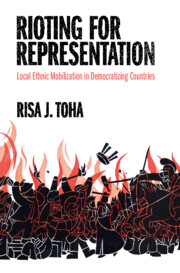Book contents
- Frontmatter
- Dedication
- Contents
- List of Figures
- List of Tables
- Acknowledgements
- 1 Introduction
- 2 Exclusion and Violence during Democratic Transitions
- 3 The Emergence of Identity-Based Cleavages in Indonesia
- 4 Ethnic Politics in Soeharto’s New Order Regime
- 5 Golkar’s Dominance and Ethnic Riots
- 6 Micro Dynamics of Exclusion and Riots
- 7 How Riots Dissipated
- 8 Conclusion
- Appendix A Data Collection Protocol
- Appendix B Additional Tables and Figures
- Glossary
- References
- Index
4 - Ethnic Politics in Soeharto’s New Order Regime
Published online by Cambridge University Press: 28 October 2021
- Frontmatter
- Dedication
- Contents
- List of Figures
- List of Tables
- Acknowledgements
- 1 Introduction
- 2 Exclusion and Violence during Democratic Transitions
- 3 The Emergence of Identity-Based Cleavages in Indonesia
- 4 Ethnic Politics in Soeharto’s New Order Regime
- 5 Golkar’s Dominance and Ethnic Riots
- 6 Micro Dynamics of Exclusion and Riots
- 7 How Riots Dissipated
- 8 Conclusion
- Appendix A Data Collection Protocol
- Appendix B Additional Tables and Figures
- Glossary
- References
- Index
Summary
This chapter provides a macro-historical context of Indonesia’s thirty-two years of authoritarian rule under President Soeharto and the country’s subsequent transition to democracy in 1998. Soeharto’s combined strategy of rapid development, depoliticization of the masses, and preferential treatment of specific groups carried important implications for the local political representation of ethnic groups. During Soeharto’s New Order regime, Golongan Karya (better known as Golkar), the political organization associated with Soeharto, developed a deep and dominant presence in villages throughout the country, effectively crushing alternative forces of political mobilization and engagement. Furthermore, in ethnically diverse areas, Golkar coopted and colluded with local members of certain ethnic communities while snubbing others. As such, even though Golkar was not an ethnic party in the traditional sense, in ethnically diverse districts Golkar officials who rose through the bureaucratic ranks appeared to come from one group at the expense of others, thereby exacerbating the politicization of ethnic identities over time.
Keywords
- Type
- Chapter
- Information
- Rioting for RepresentationLocal Ethnic Mobilization in Democratizing Countries, pp. 69 - 118Publisher: Cambridge University PressPrint publication year: 2021

